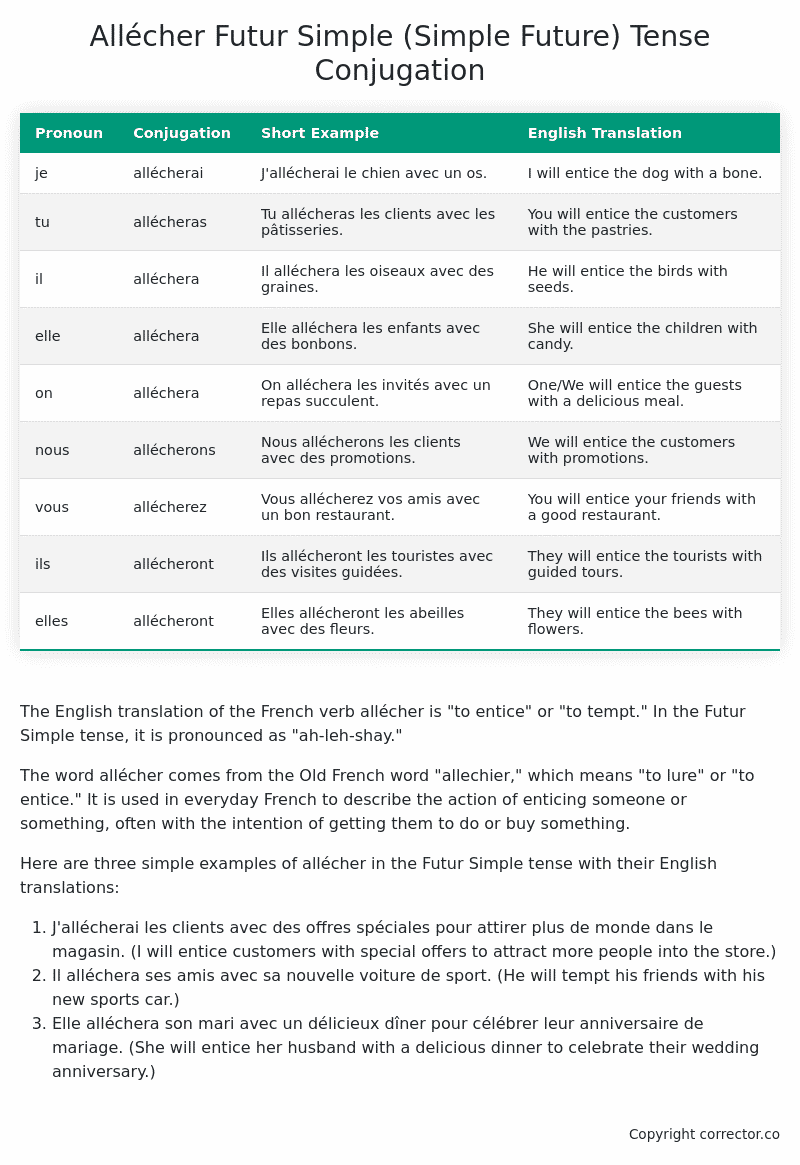Futur Simple (Simple Future) Tense Conjugation of the French Verb allécher
Introduction to the verb allécher
The English translation of the French verb allécher is “to entice” or “to tempt.” In the Futur Simple tense, it is pronounced as “ah-leh-shay.”
The word allécher comes from the Old French word “allechier,” which means “to lure” or “to entice.” It is used in everyday French to describe the action of enticing someone or something, often with the intention of getting them to do or buy something.
Here are three simple examples of allécher in the Futur Simple tense with their English translations:
- J’allécherai les clients avec des offres spéciales pour attirer plus de monde dans le magasin. (I will entice customers with special offers to attract more people into the store.)
- Il alléchera ses amis avec sa nouvelle voiture de sport. (He will tempt his friends with his new sports car.)
- Elle alléchera son mari avec un délicieux dîner pour célébrer leur anniversaire de mariage. (She will entice her husband with a delicious dinner to celebrate their wedding anniversary.)
Table of the Futur Simple (Simple Future) Tense Conjugation of allécher
| Pronoun | Conjugation | Short Example | English Translation |
|---|---|---|---|
| je | allécherai | J’allécherai le chien avec un os. | I will entice the dog with a bone. |
| tu | allécheras | Tu allécheras les clients avec les pâtisseries. | You will entice the customers with the pastries. |
| il | alléchera | Il alléchera les oiseaux avec des graines. | He will entice the birds with seeds. |
| elle | alléchera | Elle alléchera les enfants avec des bonbons. | She will entice the children with candy. |
| on | alléchera | On alléchera les invités avec un repas succulent. | One/We will entice the guests with a delicious meal. |
| nous | allécherons | Nous allécherons les clients avec des promotions. | We will entice the customers with promotions. |
| vous | allécherez | Vous allécherez vos amis avec un bon restaurant. | You will entice your friends with a good restaurant. |
| ils | allécheront | Ils allécheront les touristes avec des visites guidées. | They will entice the tourists with guided tours. |
| elles | allécheront | Elles allécheront les abeilles avec des fleurs. | They will entice the bees with flowers. |
Other Conjugations for Allécher.
Le Present (Present Tense) Conjugation of the French Verb allécher
Imparfait (Imperfect) Tense Conjugation of the French Verb allécher
Passé Simple (Simple Past) Tense Conjugation of the French Verb allécher
Passé Composé (Present Perfect) Tense Conjugation of the French Verb allécher
Futur Simple (Simple Future) Tense Conjugation of the French Verb allécher (this article)
Futur Proche (Near Future) Tense Conjugation of the French Verb allécher
Plus-que-parfait (Pluperfect) Tense Conjugation of the French Verb allécher
Passé Antérieur (Past Anterior) Tense Conjugation of the French Verb allécher
Futur Antérieur (Future Anterior) Tense Conjugation of the French Verb allécher
Subjonctif Présent (Subjunctive Present) Tense Conjugation of the French Verb allécher
Subjonctif Passé (Subjunctive Past) Tense Conjugation of the French Verb allécher
Subjonctif Imparfait (Subjunctive Imperfect) Tense Conjugation of the French Verb allécher
Subjonctif Plus-que-parfait (Subjunctive Pluperfect) Tense Conjugation of the French Verb allécher
Conditionnel Présent (Conditional Present) Tense Conjugation of the French Verb allécher
Conditionnel Passé (Conditional Past) Tense Conjugation of the French Verb allécher
L’impératif Présent (Imperative Present) Tense Conjugation of the French Verb allécher
L’infinitif Présent (Infinitive Present) Tense Conjugation of the French Verb allécher
Struggling with French verbs or the language in general? Why not use our free French Grammar Checker – no registration required!
Get a FREE Download Study Sheet of this Conjugation 🔥
Simply right click the image below, click “save image” and get your free reference for the allécher Futur Simple tense conjugation!

Allécher – About the French Futur Simple (Simple Future) Tense
Formation of Futur Simple
For regular -er verbs (e.g., parler – to speak)
For regular -ir verbs (e.g., finir – to finish)
For regular -re verbs (e.g., vendre – to sell)
Common Everyday Usage Patterns
Conditional Statements
Interactions with Other Tenses
Futur Antérieur
Conditional
Present
Summary
I hope you enjoyed this article on the verb allécher. Still in a learning mood? Check out another TOTALLY random French verb conjugation!


